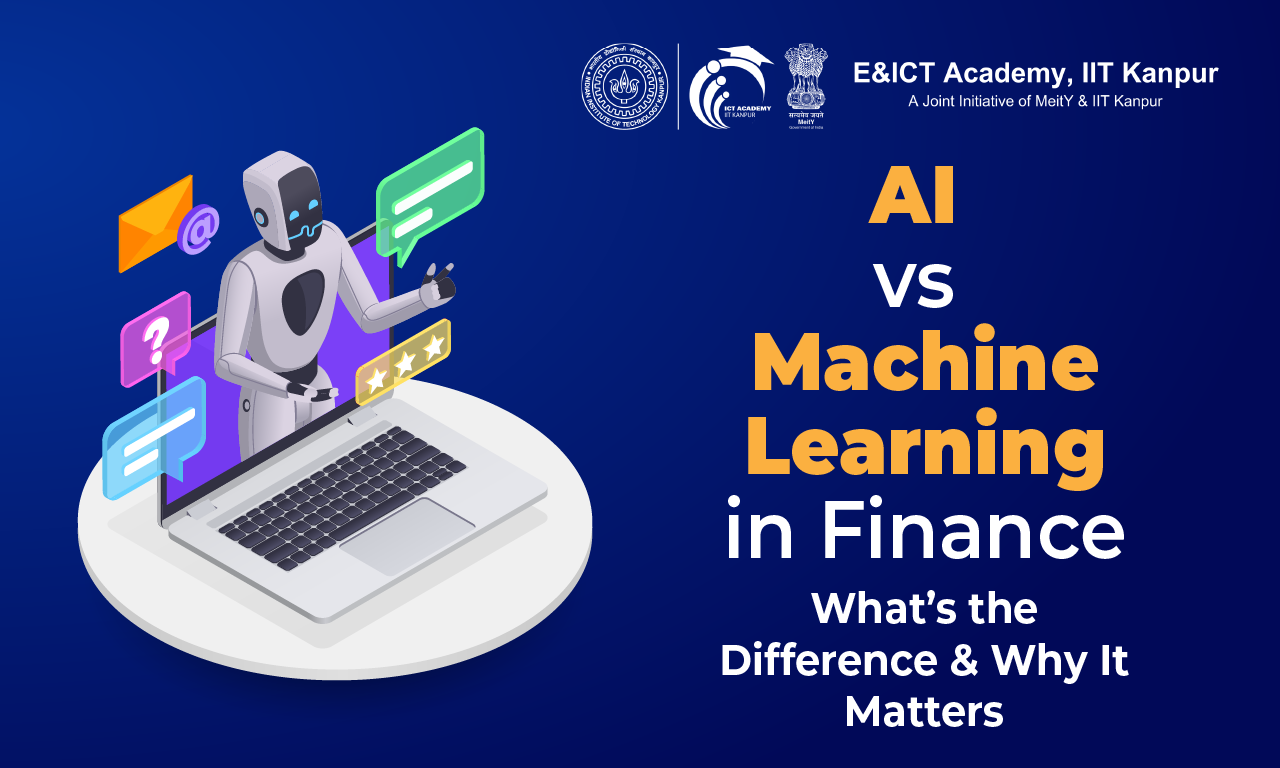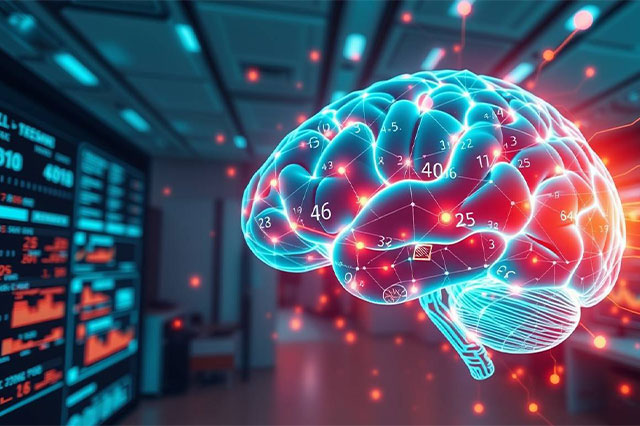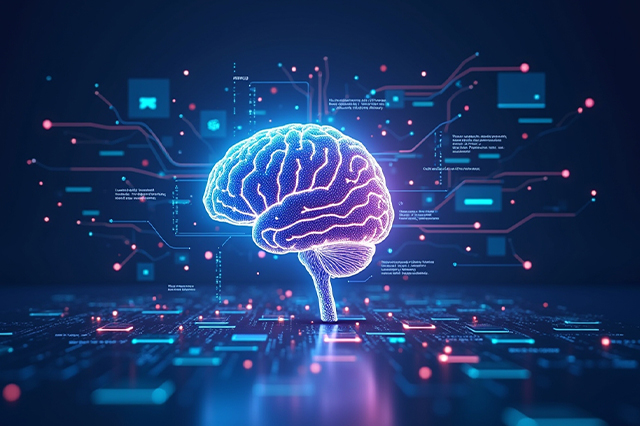AI vs Machine Learning in Finance: What’s the Difference & Why It Matters

AI vs Machine Learning in Finance: AI and ML make a noticeable difference in the financial sector as they introduce new approaches, improve the efficiency of operations, and better address risk-related problems. Occasionally, using the terms interchangeably may confuse people about their meaning. People in finance should be aware of their differences in order to make good use of AI and ML.
Understanding the unique capabilities and limitations of each technology allows financial professionals to implement the right tools for tasks such as fraud detection, credit scoring, algorithmic trading, and customer service. Clear knowledge ensures more strategic planning, increased accuracy, and a stronger foundation for innovation within financial institutions.
Top Machine Learning Algorithms Used in Financial Services
Understanding Artificial Intelligence
Machine learning is a subset of AI that helps systems evolve and get better on their own with only minimal or no coding. Historical and current data analysis by ML algorithms leads them to notice patterns and then draw conclusions or set forth decisions. ML systems can adapt and grow with new data, which makes them very helpful in constantly changing places such as the financial markets. The ML includes techniques such as supervised learning, unsupervised learning, and deep learning, each with specific applications in finance.
Top Machine Learning Projects for Finance Students & Analysts : Read Now
Key Differences: AI vs Machine Learning
Essentially, artificial intelligence and machine learning seem similar yet differ in what they offer and how they can be applied.
| Aspect | Artificial Intelligence (AI) | Machine Learning (ML) |
| Definition | An area that focuses on replicating the abilities of human intelligence | Subfield of AI focused on learning using data |
| Scope | Includes reasoning, perception, and language | Pattern recognition and prediction are the main parts. |
| Techniques | Expert systems, rule-based, ML, NLP, and robotics. | Algorithms used include regression, clustering, and deep learning. |
| Autonomy | Can be either pre-programmed or adaptive | Always based on data and is adaptive to changing conditions |
| Examples | Chatbots, fraud detection, robo-advisors | Credit scoring, using algorithms for trading, analyzes customers’ interests. |
Artificial intelligence is the main idea, with machine learning being an approach in AI that uses data and learning processes.
Applications of AI in Finance
AI positively changes the finance sector by making processes easier and more reliable.
- AI-powered algorithmic trading helps carry out market transactions faster and more accurately than humans.
- With AI, fraudulent activities are detected as they happen because the system monitors real-time transactions.
- AI in risk management assesses large datasets to pinpoint risks, identify current market trends, and support strategic planning.
- AI chatbots and virtual assistants offer help around the clock, handle usual requests, and customize customer experience.
- AI makes it easy for institutions to track and meet all the regulatory rules they must follow.
While data science and generative AI are creating a big impact, for in-depth knowledge, refer to the DSGenAI program at EICTA, IIT Kanpur.
Applications of ML in Finance
Machine learning is central to many innovations in finance because of its ability to work with data.
- With the help of ML models, the credit risk of loans can be predicted by checking many data points, improving the fairness of loan decisions.
- To prevent fraud, ML algorithms review transaction data all the time and adjust to new patterns as they appear.
- ML systems that are part of algorithmic trading use live market data to find opportunities that can be traded automatically.
- ML helps businesses by analyzing customers to create products, campaigns, and services that are easier to improve retention and satisfaction.
- Predictive analytics in ML forecasts the changes in markets, rates, and economic trends, which supports wise data-guided investments.
To learn more about how ML is shaping finance, explore Machine Learning in Finance.
Why the Difference Matters
Understanding the distinction between AI and ML is essential for several reasons, of which the important ones are mentioned below:
- Financial institutions should choose the right technology to address the various challenges they encounter. AI deals with specific tasks that are challenging, while ML helps notice patterns in data.
- The features required in regulated situations are transparency, explainability, and auditability, and these change with the type of technology employed.
- The first step in upskilling teams is defining the AI and ML skills so that time and resources are used efficiently.
- With AI and ML, companies can work more efficiently, improve customer satisfaction, and lead in the market.
Upskilling for the Future: AI and ML Together
As the financial sector evolves, professionals must develop expertise in both artificial intelligence and machine learning. The use of these technologies will continue to advance automation, new ideas, and data analysis for decision-making. Upskilling initiatives should focus on:
- A good level of mastery in programming, analyzing data, and developing algorithms.
- Familiarity with financial offerings, laws, and the practice of managing risk is needed.
- Being aware of the ethical implications and compliance requirements of AI and ML applications.
Institutions like EICTA IIT Kanpur offer specialized training in AI and ML for finance, equipping professionals with the skills needed to thrive in this rapidly changing landscape.
Harnessing AI and ML for Financial Transformation
The difference between artificial intelligence and machine learning matters for financial institutions since it shapes their progress, competition, and customer service. Artificial intelligence forms the main structure for both automation and decision-making, with machine learning giving it the data needed for prediction and tailored experiences. Moving into a digital future, AI and ML together will open new possibilities, deal with risks more effectively, and guide the future of financial services.
Using the strengths of AI and ML together, the financial sector can create a more durable, efficient, and customer-focused setting that stands ready for the future.
Recommended Courses

Advanced Certificate Program in AI for Leaders

AI & Digital Transformation

AI for Machine Learning: Foundations to Frontier Applications

AI for Managers

AI Product Leadership Program

Deep Learning with Generative AI for Computer Vision

Generative AI Course

Generative AI – 2-Day Offline Workshop

Machine Learning with Python

Professional Certificate Course in Generative AI and Machine Learning

Professional Certificate Program in Leadership with AI



